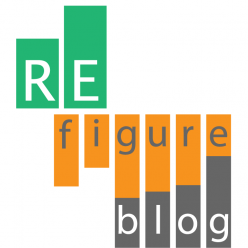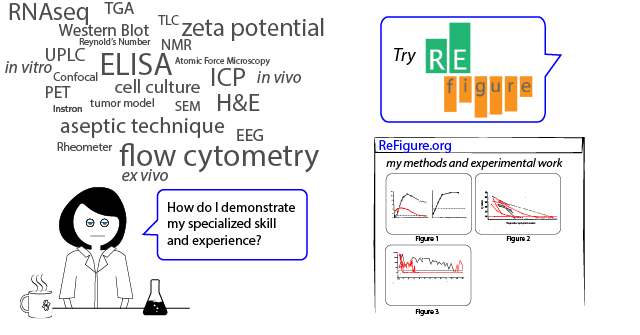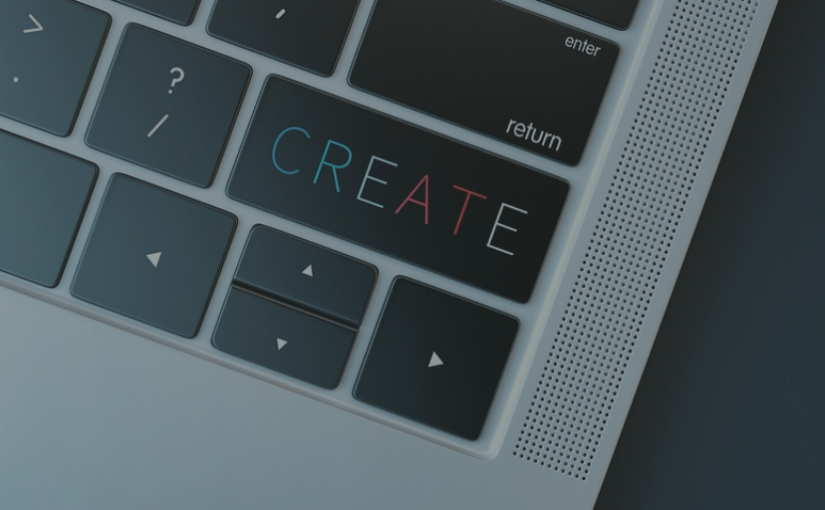We are back this year with an enhanced, month-long, online event for Cancer Immunotherapy Month. Continue reading Figure collections on Cancer Immunotherapy
Category: Featured
Week 4: Are you too inexperienced to start building a science identity?
This week in the ReFigure Undergraduate Research Course we recap what we have learnt and ask how you can turn this learning into a science identity on social media . You may have heard of “fake news” on social media. By sharing your learning you can combat fake trends, educate people about science, build a science network and identity and find jobs. Continue reading Week 4: Are you too inexperienced to start building a science identity?
Week 2: Let’s start reading papers and creating research outputs!
This is Week 2 of the ReFigure Undergraduate Research Course. Click for introduction and Week 1. As promised you are going to start diving into the topic of your choice and creating outputs that demonstrate your learning. This week’s video is great at explaining how to read papers and was made by Kishwaukee College Library. Continue reading Week 2: Let’s start reading papers and creating research outputs!
Collaboration announcement: ReFigure and Fractal Flows
The ReFigure team is pleased to announce a collaboration with Fractal Flows, an online platform for collating hard evidence with the aim of coming to a consensus about scientific or engineering based claims. Fractal Flows integrates facts & opinions, reveals social bias and emphasizes informed outliers. Fractal flows allows anyone to host “claims”. An example of a claim is “Global warming causes climate change”, and users of the platform can submit evidence, so called “knowledge bits”, which could be data, analysis, simulations, code, mathematical models & formulations, an article or scientific paper link, an anecdotal or personal opinion that supports or refutes the claim. The annotated knowledge bits collected from various sources by Fractal Flows allows users healthy debate, shows the provenance of knowledge bits and will hopefully encourage consensus.
An important mission of ReFigure is to give researchers, especially early career researchers, maximum visibility for their interim research products and insight. Thus public ReFigures that follow the recommended guidelines by the team will be submitted to Fractal flows as knowledge bits or claims attributed to the ReFigure creator. Here is an example from when we tested this. We are currently refining how to attribute the claims shared on Fractal Flows to the Refigure creator.
Could images collected on Refigure feature as knowledge bits on Fractal Flows and provide depth to the knowledge bits? These and other questions are being brainstormed by both teams. Please visit fractalflows.com and share your thoughts or comments below!
How I wrote science papers as an undergrad
ReFigure your resume and standout from the crowd!
Skills and expertise developed during a science career can be so diverse and specialized that they defy common hiring practices. There might be a handful of researchers that know about a particular assay, or can execute a particular in vivo model, one that might be critical to the success of a drug development path. Beyond formal graduate degrees, a lack of standardization in career development poses problems for the candidate AND the hiring manager. For good reason, there is a lot of freedom to craft customized career paths, where scientists can pursue specific mentors and specialized knowledge at their own discretion. Mentoring received is often dependent upon the whim of the mentor and can be widely different from lab to lab.
Furthermore, it is the intellectual challenge and/or interest that tips the balance for one opportunity over another in the candidate’s selection process, the critical details of which are not always apparent in the posting, or even after the interview. For the hiring manager, short bullet statements listed in a resume give little or no information about how detailed the candidate’s knowledge and acumen are for a particular experience, or skill. All of this amounts to making a perfect, for that matter, even a good, match between a candidate and a position very difficult for bench science jobs.
Here at ReFigure, we understand this problem intimately, and we want to offer you a few suggestions:
1. Don’t sell yourself short. Everyday you are generating insights based on your reading and your work at the bench. When you finally optimize a hard assay, and the work will be relegated to supplemental figure 8C, post your optimization results on ReFigure, along with the final figure. You can write comments about what ended up being the critical parameters for that assay.
2. Be an armchair expert. Hiring managers want to see independent thinking and diverse intellectual interests. You know that evolutionary biology project you did in undergrad, but never fit into your career path? You know how you have secretly held onto that idea and kept up on the literature all these years since? Make a ReFigure collecting those studies and comment on what you think is most interesting and which experiment you would do next.
3. Capture your insights when you approach a new field. Are you applying for a job in that related field that is really hot right now? Have you done a lot of prep, maybe taken a class or two, to get you ready for your transition? There’s nothing like a fresh, objective look at new concepts when we are first learning them. Codify your new knowledge by capturing seminal studies in a mini-review on ReFigure. You can synthesize and consolidate your new knowledge and show it off to others. Followup with your interviewers and provide them a link to your ReFigure. You can emphasize your perspectives and engagement in their field.
Those are just some ideas of how you can use ReFigure in your job search. Check out more of our featured ReFigures on this blog for inspiration and sign up for an account today at refigure.org. Need help getting started? Check out our 5 easy steps here. What are you waiting for? You’re a few clicks away from making yourself stand out from the crowd.
#ShowYourRare- Rare Disease Day at ReFigure
Did you know there are around 6000 health conditions that are considered rare diseases? It is easy to overlook these when we hear so much about common ailments like heart disease, or obesity. The criteria for a rare disease differs between the US (< 200,000 cases at any given time) and the EU (affects fewer than 1 in 2000), but in both cases the incidence is low. While relatively few people are afflicted by any one disease, the population of total patients with rare diseases is a large number. Such consideration prompted, in part, the US Orphan Drug Act (1983) and the EU regulation on orphan medicinal products (2000) which have stimulated research to benefit these populations, directly providing hundreds of millions of dollars towards research and incentivizing the pharmaceutical industry to pursue cures. This research has changed (and continues to change) millions of lives.

Research into rare diseases, though, has the potential to impact everyone. Over 80% of rare diseases are genetic in origin. It is a standby of biological research to identify function by alteration of the genetic sequence in order to delete, or impair function, categorically conducted within appropriate models. A classic example of this are the random mutagenesis studies that revealed so much in fruit fly development many years ago (for those unfamiliar, see this blog as an introduction to experimental fly genetics) and accelerated an entire field. Even in the age of exceedingly cheap sequencing and rapid advances for in silico approaches, genetic manipulation remains the gold standard to conclusively reveal function. Naturally arising genetic variants within human populations tell unique stories that experimental studies can only approximate.
Today is Rare Disease Day, and I wanted to take a moment to highlight some recent ReFigures that touch on the diverse range of rare diseases:
- A brief collection of recent studies (including two animal models) of Treacher Collins Syndrome
- An introductory explanation of neural tube defects (one of the most prevalent rare diseases)
- An overview of cutaneous lymphoma subtypes (even though we hear a lot about cancer, many cancers are considered rare)
The point of Rare Disease Day is to raise awareness about these important human conditions. See the official website here and the call to action for everybody. My best friend has a rare, genetic disease, and I want to add our voice at ReFigure to these efforts. If you are a patient, a researcher, a caregiver, a doctor, or anyone, remember we all share the same genes; it’s what makes us human! Let’s study them and learn how to alleviate suffering.
If you have particular insights about a rare disease, create a ReFigure on that disease, collect the findings that are most important to you (see 5 easy steps to get started here) on this Rare Disease Day 2018!
Looking for a science job? Showcase your scientific expertise and skill
When it comes time to find a job in science, it can be hard to find the best match between what an individual has to offer and an organization’s needs. At the very outset of the job search, you may have a hard time fitting all your lab skills and unique, valuable insights into the standard CV, or resume format. At ReFigure, we have a solution for you.

ReFigure is ideally suited to showcasing your individual expertise and work. Whether it is that paper, where you contributed as a 3rd+ author, or your unique perspective on that target that everyone is pursuing, ReFigure allows you to capture those individual experimental results all in one place. You can assemble them in any order you want and annotate them as you see fit.
Here are just 3 ways ReFigure users have been able to highlight their scientific skills and output:
1. Synthesize the knowledge and uncertainty in calcium channel signaling
2. Expertise on a single target (RIP140) across species and tissues
3. Summary of a literature review for a short research project
Everyday you work hard at the bench; everyday you are creating new knowledge; use ReFigure to communicate your value. What are you waiting for? Need a hand? Check out our 5 simple steps to creating your first ReFigure or get started right now by installing the ReFigure Chrome extension.
Comparing conflicting data with ReFigure
Conflicting literature is a fact of life in academic research. Labs in conflicted fields undoubtedly have opinions about which experiments and publications are favored and why. However, a public platform for comparison does not exist, meaning that all the insights from discussions that occur between colleagues and at lab meetings are not distributed to the scientific community at large. ReFigure has given me a mechanism to conduct comparisons between publications, helping to discern the subtle differences in expression systems, experimental setup, or cloning that might explain conflicting results. Not only can I use ReFigure to organize my own thoughts so as to progress my research, it allows me to organize these ideas publically to help others in my field. I invite you to read further and view my ReFigure.
5 easy steps to try out ReFigure (and why you should)
We hear you. Maybe you are too busy to learn, or unsure how ReFigure works, or even shy of creating a ReFigure. Below, we list 5 simple steps to try out ReFigure and how it can help you and science.
Continue reading 5 easy steps to try out ReFigure (and why you should)









